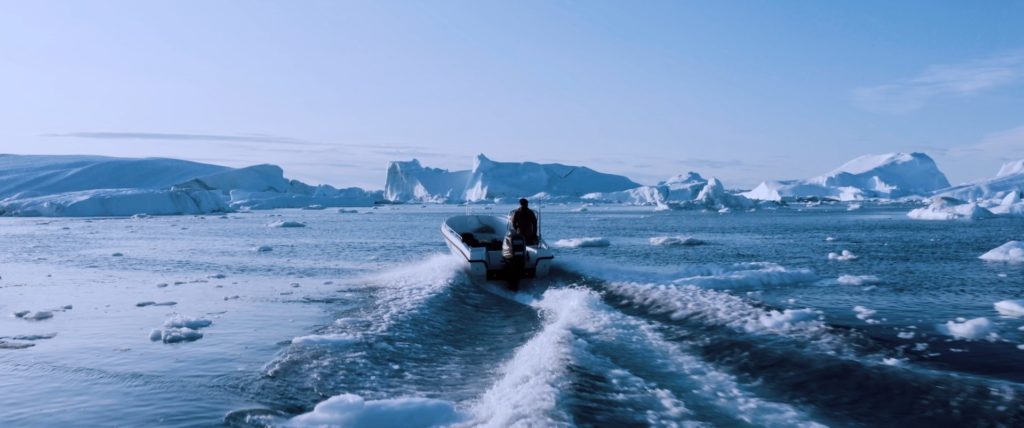The perfect storm of a changing climate and the rapid encroachment of the modern age has dramatically impacted the Arctic people — forcing them to cope with change beyond their immediate control in the present — not the future. The short film Open Water is a triptych narrative, based on the lives of three Greenlanders: a hunter, a ship’s captain, and a fisherman, individuals whose very existence and heritage is intertwined with the Arctic Ocean. On a warming planet, open water, an ocean without ice, offers both economic opportunity for fishermen in terms of access to halibut grounds in winter and a longer tourism season, but also cultural decay in terms of traditional ways of life.
Filmmaker Dan McDougall on the challenges faced while filming:
We spent a month in The Arctic in total and focused on two communities. One town in the North West and a second in the South-East of Greenland. Logistically speaking Greenland can be as challenging as parts of Africa. For one thing, there are no roads linking towns and communities. It’s a place of such extremes that you cannot truly experience it without visiting at least twice, winter and summer. It’s two different worlds.
I would suggest that anyone interested in Greenland start by looking at a map and then try to understand its scale. A Danish friend once compared the topography of Greenland to me as a bloated Christmas pudding, overladen with frosty icing.
A festive cake with very little sponge exposed. The island’s brilliant white ice sheet is so vast that it covers 80 per cent of the land. At its center, at almost two miles thick, it generates its weather system. A mass so high that it deforms the earth, pushing bedrock into the mantle. Greenland’s very orbit affects the distribution of the gulf stream in the Atlantic Ocean. It’s beyond our comprehension.
To fly from the south of Greenland to the West, we had to fly back to Iceland and then down to Copenhagen. From there we then flew directly up to the West Coast. Then there is the prohibitive cost of operating there. Flights are much as £2000, and local translators and hotels are more expensive than filming in European capitals. A curious thing about Greenland is many hotels served frozen Halibut even though the world’s biggest Halibut fleet is never further than 1km away. This is often offered as a local story.
Of course, the other challenge when discussing the emotions of people in The Arctic is Greenlanders practically wrote the book on stoicism. Getting interviewees to open up in the way you would hope isn’t always possible. Still, in the process of conversations, there can be the most extraordinary moments and lines that are almost poetic. I loved this unpredictably. It made for a painful edit but finding these moments was rewarding. I think Nick Nielsens opening line in the film is one of the strongest I could have hoped for: “I am from the Arctic….to me it’s not a new thing to meet the mountain….to meet the ice…..to meet the wind. I have been doing this since I was a child.”


